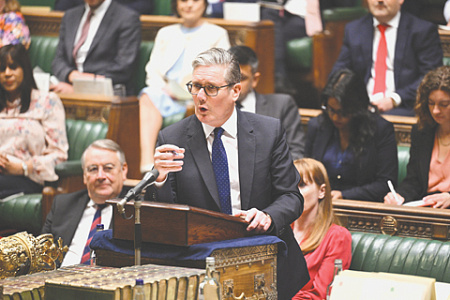
Barely a year into his premiership, British Prime Minister Keir Starmer is facing a significant political crisis, forcing him into a public apology for neglecting domestic social issues. In a recent interview, Starmer admitted that his focus on pressing foreign policy matters, including the conflict in the Middle East and a recent NATO summit, led him to misjudge the mood within his own Labour Party, culminating in a damaging internal revolt over government policy.
The flashpoint for the turmoil is a controversial government bill aimed at generating approximately £3 billion in budget savings by cutting benefits for the disabled. The proposal, which would tighten eligibility criteria for financial support, triggered a fierce backlash within Labour’s ranks, with over 120 of the party’s 411 Members of Parliament threatening to vote against their own government. Critics accused the Prime Minister of betraying the party’s core ideology as the historical defender of the working class by attempting to balance the books at the expense of the country’s most vulnerable citizens.
Faced with a rebellion of this scale—a perilous sign for any British leader—Starmer was forced into a major U-turn. He conceded that the welfare reforms would not affect current benefit recipients and would only apply to future applicants. However, this compromise has failed to quell the dissent entirely and has reinforced a growing perception of Starmer as an indecisive leader. This marks his third significant policy reversal in the last month, following retreats on plans to limit heating subsidies for pensioners and a decision to launch a national inquiry into child sexual exploitation, an issue he had previously dismissed.
These repeated climbdowns have emboldened internal critics, who are now reportedly planning further challenges on issues ranging from inheritance tax to migration and child benefit limits. The instability comes at a critical time for the UK economy. Chancellor Rachel Reeves is grappling with a £40 billion budget deficit, and the prospect of raising taxes this autumn now looms large, directly contradicting Labour’s key election promise of achieving economic growth without tax hikes. Compounding the fiscal pressure is a new commitment made at the recent NATO summit to increase the UK’s defense spending to 5% of its GDP.
If Starmer cannot regain control of his party, he risks suffering the same fate as his Conservative predecessors Rishi Sunak, Liz Truss, and Boris Johnson, whose premierships collapsed after losing the confidence of their own MPs. Labour’s decisive election victory in 2024 was widely seen as a result of Conservative infighting and failure. Now, with his own party in disarray, Starmer may be inadvertently creating an opportunity for the Conservatives to rebuild and capitalize on Labour’s mounting problems.
